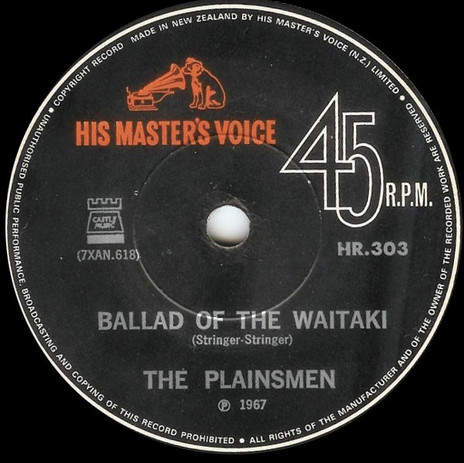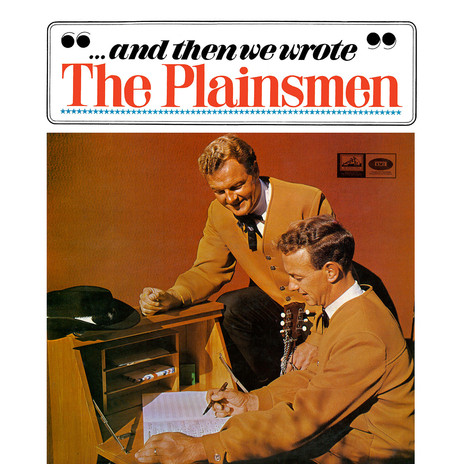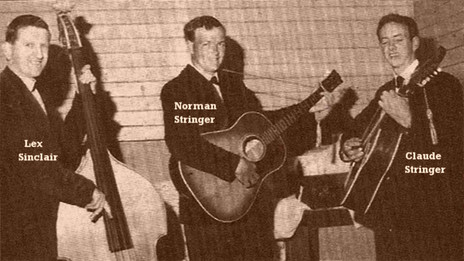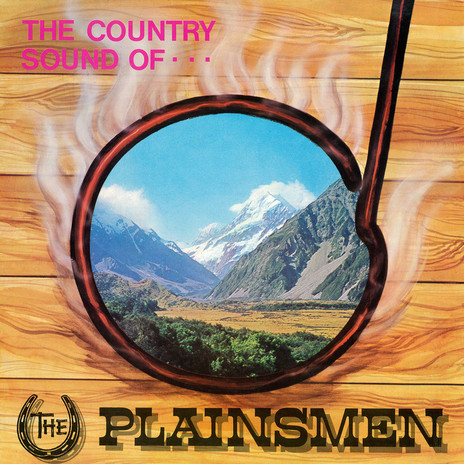A lack of promotion from HMV and the inability of the Stringers to stay away from home for too long – Norman was married with three children, Claude married with four – meant The Plainsmen were limited to local legend status in and around Canterbury and Otago, helped no end by a weekly half-hour live radio show on Timaru’s 3XC.
Claude Stringer was born in Timaru in 1933, and Norman in Roxburgh in 1935. Their father, of Welsh descent, would sing at dances in the 1930s and 1940s, and the boys took up guitar while Claude was also in a brass band as a teenager. Every Sunday night the family would sing around the piano.
By the late 1950s, the boys were a regular attraction at dances around southern Canterbury as The Stringer Brothers.
By the late 1950s, the boys were a regular attraction at dances around southern Canterbury as The Stringer Brothers, performing American country music of the time by such artists as Hank Snow and Marty Robbins.
A third placing in one of the final national Search For The Stars radio talent quests saw The Stringer Brothers and other finalists tour the country. At one of their later South Island engagements, The Stringer Brothers were spotted by Kiwi Records and signed to the label. Their self-titled EP was recorded at 3YA in Christchurch and included a couple of songs written by Norman and Claude.
The next time they heard from Kiwi Records was to inform them that their recording contract had been sold to His Master’s Voice (NZ) Ltd. When they learned their new label wanted an album a year for the next five years, the Stringers recognised a lack of national heritage outside of traditional Māori waiata and made a decision to record their own songs of New Zealand.
They set about writing – Norman mostly responsible for the lyrics and Claude the music – and renamed themselves The Plainsmen in honour of their Canterbury Plains home. They enlisted Lex Sinclair on upright bass and Russell Stevenson on piano and undertook work in Christchurch and Dunedin.
The Plainsmen’s first LP, …And Then We Wrote, was recorded at the HMV studios in Wellington in 1967, sympathetically produced by Paul Pearce, son of influential broadcaster Arthur “Turntable” Pearce. The sessions were concluded at a brisk pace and the band adjourned to Turntable’s home to listen to records otherwise unavailable in New Zealand.
The album provided a radio hit in parts of Australia with ‘Bullocky Jones’, while ‘Ballad Of The Waitaki’ would garner plenty of radio airplay at home and go on to be covered by country music singers Dusty Spittle and Danny McGirr, Timaru folkies The Picasso Trio and even household name John Hore on his 1972 album Travellin’ Singin’ Man. It also gained them a spot on the television show The Country Touch and work with the host Tex Morton, who tried fruitlessly to coax the band to accompany him on a national tour.
Their second and final LP, The Country Sound Of… The Plainsmen, recorded at HMV in 1968, wasn’t such smooth sailing. Bass player Lex Sinclair had left and the orchestra session bassist took some time to get to grips with the country styling. Producer and HMV A&R manager Howard Gable was also struggling to get where The Plainsmen were coming from. The band did get to stick around afterwards to watch as Gable produced Allison Durbin’s Loxene Golden Disc-winning ‘I Have Loved Me A Man’.
Despite the initial non-written agreement with HMV being for five albums, there would be no more Plainsmen recordings. They continued as a trio, appearing as guest artists at various cabaret venues, but once the 3XC radio contract finished up, the enthusiasm faded.
The Plainsmen continued to be a popular draw at the annual Caroline Bay Carnival in their home town for the next 15 years. Norm and Claude would change into their stage clothes at the port of Timaru, sing at the carnival, and then change back into their work clothes and return to the wharf.
Their final public performance was at the Gold Guitar Awards in Gore in 1998 where The Plainsmen were inducted into the Hands of Fame. Claude Stringer passed away less than 10 years later after a long battle with cancer. Norm Stringer is now living in Blenheim.



